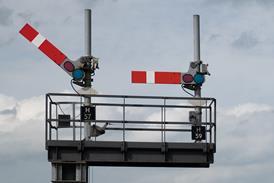SPEAKING on June 3 during a debate on the ’audit’ of major transport infrastructure projects (RG 4.03 p179), French Minister of Transport Gilles de Robien identified a funding gap of at least €1·bn a year for the next 20 years if the government is to meet its commitments. Options include the introduction of lorry fees for use of motorways, higher fuel taxes for road vehicles, privatisation of motorways, or additional funding from the European Union.
De Robien had insisted earlier that no major transport schemes would be abandoned, but his commitment to the Lyon - Torino high speed line with its long base tunnel was measured. ’There is an international agreement, and it will be respected’, he said, adding that it was ’vital to be aware of all the technical aspects and to state the exact cost honestly’, as well as to specify how it could be funded.
De Robien was at pains to dismiss the previous government’s target of doubling rail freight traffic by 2010 and trebling it by 2020 as ’utopian’. He considered that the potential for growth in rail freight was ’at least 20%, especially on major corridors’, pointedly adding that there could be much more ’if service quality was adequate’. Growth in passenger traffic by rail would not exceed 16% to 20% if no further high speed lines were built, but road traffic was expected to expand by 40% to 60%.
A ’credible policy’ to halt the decline in rail freight would be to increase tonne-km from 50 billion to 55 or 60 billion in five to seven years, an objective suggested by Senators Hubert Haenel and François Gerbaud in their damning report on SNCF’s freight business (RG 4.03 p177). But even as de Robien was repeating the need for SNCF to tackle its service quality problems, trains across the network were being delayed or cancelled because of strike action.
Widespread industrial action in protest against the government’s plan to alter the present generous pensions regime has affected all public services in France. According to Prime Minister Jean-Pierre Raffarin, SNCF and Paris operator RATP are excluded from the plans, and SNCF President Louis Gallois sent letters to staff in late May saying that ’the railway staff pensions regime is not part of the reform’. But memories of previous disputes over the same issue linger on, and there is a widespread belief among railway staff that their special status will come under attack sooner or later. This time Gallois warned that the future of SNCF’s freight business is at stake, with every strike day costing the railway €20m. Unfortunately, he is right, and rail’s competitors on French roads are rejoicing.




















